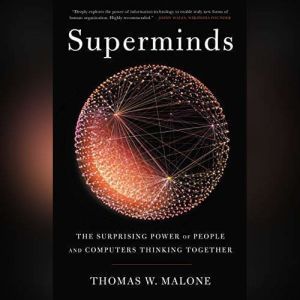Synopsis
From the founding director of the MIT Center for Collective Intelligence comes a fascinating look at the remarkable capacity for intelligence exhibited by groups of people and computers working together. If you're like most people, you probably believe that humans are the most intelligent animals on our planet. But there's another kind of entity that can be far smarter: groups of people. In this groundbreaking book, Thomas Malone, the founding director of the MIT Center for Collective Intelligence, shows how groups of people working together in superminds -- like hierarchies, markets, democracies, and communities -- have been responsible for almost all human achievements in business, government, science, and beyond. And these collectively intelligent human groups are about to get much smarter. Using dozens of striking examples and case studies, Malone shows how computers can help create more intelligent superminds simply by connecting humans to one another in a variety of rich, new ways. And although it will probably happen more gradually than many people expect, artificially intelligent computers will amplify the power of these superminds by doing increasingly complex kinds of thinking. Together, these changes will have far-reaching implications for everything from the way we buy groceries and plan business strategies to how we respond to climate change, and even for democracy itself. By understanding how these collectively intelligent groups work, we can learn how to harness their genius to achieve our human goals. Drawing on cutting-edge science and insights from a remarkable range of disciplines, Superminds articulates a bold -- and utterly fascinating -- picture of the future that will change the ways you work and live, both with other people and with computers.




